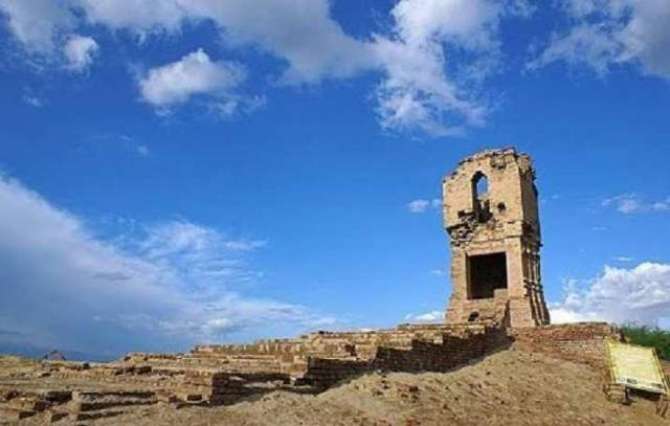Historical Heritage, Pattan Minara

The Patan Minara is a glorious historical heritage of Pakistan's ancient past due to its cultural distinctions in the Hakra Valley.
Tourists
from all over the world, including Pakistan, and especially those who are
exploring civilization and culture, feel that their journey is incomplete until
they visit this ancient Patan Minara of Rahim Yar Khan and this was confirmed
by renowned American journalist Cynthia Don Richie. Also on the occasion of his
visit Rahim Yar Khan, you will be able to know what is the Pattan Minara
and how old is its history through this article?
How Long Distance from City
About 6
miles southeast of Rahim Yar Khan town is the ruins of a great ancient city
and a major river port on the banks of the dried river Hakra in the Cholistan
desert. Because of the door, the hollow has become a rare example of this the ancient world, not of this earth or the mainland.
Here the
important symbols of the ancient Hindu, Buddhist, and Islamic eras are telling
the stories of the civilizations of the past and generations from the present
to the present. All the major cities of the world were settled by the rivers in
the ancient eras, In fact, the so-called river civilizations.
In this
regard, the Patan Minara is a glorious historical heritage of Pakistan's
ancient past due to its cultural distinctions in the Hakra Valley. It is a high
place because the era of goodness, truth, purity, and piety has also passed
here.
Educational
and preaching centers were also established here and cultural and religious
festivals were celebrated. The Shivratri festival was celebrated with great
fanfare. The story of Mahadevi, the daughter of Goddess Saraswati is also
attributed to this ancient city of Patan Minara. It was located and due to its
location, it gained immense political, military, and commercial importance.
History
The ancient city of Patan Minara being in the very center of the Indus Valley has been a contemporary of Moenjodaro and Harappa. But then it happened that the river Hakra of Cholistan dried up and this geographical change brought this cradle of high civilization.
Impose desolation and now it is nothing more than a few ruins and ruins of a buried city where after the rains people used to go in search of ancient coins, stones and other valuables of metal but disrespect the present rulers and influential people.
With the installation of a water treatment plant and ruthless excavation and reversal of the site, the dreams of the archaeologists have also been shattered.
Most
historians refer to the ruins of the city on the hill near Sukkur and Rohri as
Alwar and consider it to be the government of the Mausoleum Keynes Cadara. They
consider the place to be a disappointment and say that the place where Siu Sang
(a Chinese tourist) used to reach from a certain distance from Gujarat
Vakthiyawar.
Personalities
In
addition, the eminent historian and scholar Syed Noor Ali Zaman Hussaini has
proved with historical and geographical evidence that if one looks at his the building, fort, and the signs and remains spread over several miles, then in
Sindh is more than that. Traces of a beautiful, standard, spacious, and prosperous city is nowhere to be found.
Alexander
the Great made the city his second-largest capital and launched a military campaign against Aquinas, the ruler of the southwestern region, from the Patan
Minara.
Was Limberg also thinks that the city of Alexander's time, which the Greeks call "Benagara", was also close to "Alvar". If the opinion of Syed Noor Ali Zaman Hussaini is to be considered correct, then The nearby Bandur area will have to be recognized as "Bina Gara".
In addition,
there are archeological sites and monuments of Khokhar, Darwaza, and Bandur
within ten miles of Patan.
Which testifies to the extensive planning of Patan. Grain warehouses,
stalls, palaces, and temples were built in different directions.
Buddhist Temple
If this evidence is put forward, then even at the time of arrival of Chinese tourists, the capital city of Sindh is considered to be Patan Minara. As Hyun Sang in his memoirs has named this city as "Pippen Polo". According to Yen, the Patan Minara is the tallest piece of the great building of the Buddhist temple. "
This large brick
building with a chair fifteen feet above the present ground level and a 26 feet
high building with a width of 12 Square feet above it exists. That the present
tower, which from afar still looks like a minara, is a part of a great central building.
And from this one piece, the style of high architecture can be seen.
Rajhasthan
Colonel
Todd's account of Rajasthan describes Patan as the seat of a Hindu king in the
10th century AD. He mentions a magnificent temple there and says that a large
fort to the east of the building leads to it. There is a Hindu temple in the
middle of a high and central place where the festival of Shiv Artri was
celebrated every year.
From time immemorial, the rulers of India and Rusa used to visit here. Maharaja Ajgan of Sindh Beka Nair and Jaisalmer considered it a great pleasure to visit this temple. Colonel Manchin, a British resident stationed in the state of Bahawalpur, narrates: Some Sindhi texts were found inscribed on the inner plaster of the Buddhist building in Patan.




1 Comments